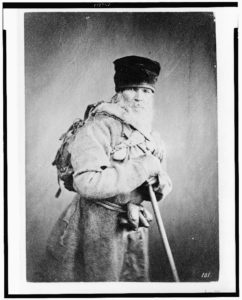In its New Year’s piece 150 year ago today The New-York Times changed up the Janus imagery a little bit:
… New Year’s Day is like a hill upon which a traveler pauses to rest, to look back over the ground he has traversed, and to look forward to that which is before him. How long it took to reach the place on which he stands; how short the distance to the eye, now that it has been passed over! Points of interest were slow of reaching, and few and far between, but in the foreshortening of the landscape they seem a little crowded now.
We start fair this morning upon a new stage of the journey, and as the stage is twelve months[,] long let us lay in a good stock of good temper, the best mental pabulum known to science; a good stock of self-appreciation, which pushes nations as well as people along at high speed, and above all make conscience our compass and honor our staff as we go through the journey. …
I like the idea of a rest-stop but realize it’s going to be very brief as time keeps marching relentlessly on, maybe something like Stonewall’s foot cavalry. In the same issue the Times helped out short-sighted (forgetful) people like me by providing a chronicle of EVENTS IN 1866. I double-checked February 22nd. Five separate events were listed, including the celebration of George Washington’s 134th birthday, a great Union meeting in New York to support President Johnson, and Speech by the President at Washington on reconstruction. Relations between Andrew Johnson and the Congress, northern elites, and the northern people definitely went South during 1866. The president’s Washington Birthday speech was a big part of this process. Encouraged by the audience, President Johnson named Thaddeus Stevens, Charles Sumner, and Wendell Phillips as traitors to the Union in the same category as southern rebels.
Skip ahead 10 months. In its December 28, 1866 issue The New-York Times reprinted an article from the December 20 [I think] 1866 issue of the Anti-Slavery Standard in which Wendell Phillips argued that there were two important reasons to seek a conviction of President Johnson after he was impeached. Andrew Johnson should not be allowed to pick judges for the U.S. Supreme Court:
… Such is one of the dangers of leaving a rebel at the head of the Government for two years more. We may, and probably shall, have the Supreme Court reinforced with fresh, young blood, to last another quarter of a century, and be always the refuge of abuses and the foe of progress. If his crimes have given us sufficient grounds to remove JOHNSON and avert this momentous danger, it is fool-hardy, it is madness, to leave the criminal untouched and run all these risks.
The article stated that North Carolina was still whipping negroes under state laws, but there was no state of North Carolina. The second reason Mr. Phillips wanted a conviction was that even if Congress abolished all the “phantom” state governments in the South and established Territorial governments, President Johnson would still have the power to nominate Territorial officers:
… He can so shape his nominations as to keep those Governments wholly subservient to his policy. Of course he would not name WADE HAMPTON or Mayor MUNROE to Governorships; he knows such men would never be approved by the Senate. But he can select from rebeldom, North and South, men, more decent but not less dangerous – indeed, for that very reason of their decent behavior, more dangerous than the swaggering bravos of their party – and thus, sure in time of the Senate’s acquiescence, make Territories as supple tools as he has made his so-called States.
We see, therefore, that it is impossible to make one step in the direction of permanent and thorough reconstruction while Johnson remains in office. We have the legal right to remove him; the country, indignant and disgusted, demands it; the necessity of the situation requires it. Delay is dangerous, and may be fatal. Who dares to trust such a man as ANDREW JOHNSON with the power thus to baulk the plans of the conqueror …
Thanks for the break. It looks like the path ahead in the new year may be a bit rocky.

